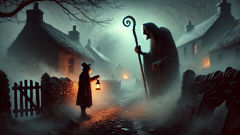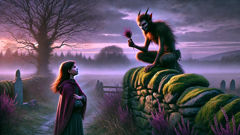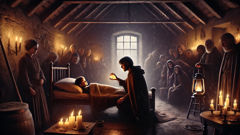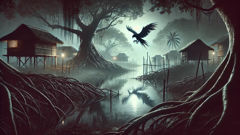Introduction
In the hush of the Irish dusk, when the last shafts of light drift behind the heathered slopes of the Slieve Bloom Mountains, there’s a silence that wraps itself around the land—a silence broken only by the distant bleat of sheep or the soft murmur of the wind through wild gorse. It’s in this liminal hour, between light and shadow, that legends come alive. Villagers who call this rugged stretch of Offaly home have long told tales of the Bodach, a figure whose presence is as chilling as the mist that creeps down from the hills. The Bodach is not a monster in the way of fangs and claws; he is something subtler, stranger, and far more dangerous. He is a trickster, a bogeyman with a bent back, tattered coat, and a smile that’s never quite right—a figure parents invoke to hush unruly children and warn them from wandering too far. But the Bodach’s legend is not just a simple tool for discipline. To those who listen closely, it whispers truths about fear, cunning, and the wisdom to be gleaned from what we do not understand. In the heart of the 19th century, as Ireland endures hardship and hunger, the Bodach steps from story into life. He slips through hedgerows and under thatched eaves, watching a small village gripped by uncertainty. His mischief is not cruelty for its own sake, but a test—a challenge to those who would dismiss the old ways, or forget that wisdom often wears the mask of the strange and unsettling. And so, as the moon rises and peat fires flicker in stone hearths, the villagers will come to know the Bodach not merely as a figure of fright, but as a keeper of riddles and hard lessons, shaping the fate of those who dare to cross his path.
I. The Arrival of the Bodach
It began on a night when the clouds hung low and the wind rattled the shutters of Clonmeen village. The air smelled of rain and something older—the musk of peat, the tang of heather, and the faintest whiff of mischief. Inside their modest cottages, families huddled by the fire, whispering stories passed down through generations. It was the season of harvest’s end, and though the potato blight had spared their fields this year, the memory of famine clung to every conversation like an unwelcome guest.

In the O’Dwyer cottage at the village’s edge, young Aoife pressed close to her grandmother, her eyes wide as she listened. “The Bodach comes for the wicked,” her grandmother warned, her voice dropping to a rasp. “He’ll snatch up any child found wandering past dusk. He’ll twist your dreams until you can’t tell friend from foe.”
Aoife trembled, but her older brother Eamon rolled his eyes. “It’s nonsense,” he muttered. “Just a story to scare us.”
That night, as a chill settled over Clonmeen, something stirred in the lanes between stone walls and wild rose. The Bodach, never truly seen but always sensed, slipped among the shadows. Where he passed, doors creaked on their hinges, dogs whimpered, and milk soured in its pail. At the crossroads stood Old Finn O’Shea, the village’s self-appointed watchman. His lantern cast a trembling pool of light, but it seemed to shrink as the mist thickened.
Finn heard footsteps—soft at first, then louder, accompanied by the tap-tap of a crooked stick. He peered into the gloom and caught sight of a figure: stooped, cloaked in rags, with a glint of mischief in his eye and a smile like a slit in wet clay. The Bodach stopped just beyond the lantern’s glow. “Good evening, Finn,” he rasped, his voice like wind through dry grass. “Mind if I rest a spell?”
Frozen by fear, Finn could only nod. The Bodach squatted by the road and began to hum a tune that made the very air shiver. Within moments, the lantern sputtered out, plunging them into darkness. When Finn relit it, the Bodach was gone, but a handful of silver coins glinted in the road—coins that, by morning, had turned to pebbles.
Word of the Bodach’s arrival spread quickly. Children were ushered inside long before sunset, and even the bravest men avoided the lanes after dark. But as days passed, strange things began to happen. Cows wandered out of their fields and returned with their tails tied in knots. Bread loaves left to cool vanished from windowsills, replaced by stones shaped like faces. At first, the villagers blamed one another. Old grudges were rekindled, tempers flared, and suspicion grew.
Aoife watched it all with a mixture of terror and fascination. Unlike her brother, she couldn’t dismiss the stories. Every morning she found footprints outside their door—small and pointed, as if someone walked barefoot through the dew. She began leaving bits of bread and a thimble of milk on the windowsill at night, a silent offering to the unseen guest.
One night, Eamon, driven by bravado and curiosity, crept out after everyone had gone to bed. He planned to catch the Bodach and prove, once and for all, that he was nothing but a tale. The moon was full, silvering the grass and deepening the shadows. Eamon reached the old hawthorn at the village boundary—a tree said to be fairy-haunted—when he heard a soft chuckle.
“Looking for me, boy?” The Bodach stepped into view, his coat tattered but his eyes sharp and ancient. Eamon tried to run, but his feet stuck fast to the ground. The Bodach circled him, humming that eerie tune. “Bold, aren’t you? But do you know the price of pride?”
With a flick of his staff, the Bodach released him. Eamon stumbled home, shaken and pale. He never spoke of what he saw, but his swagger was gone. From that night on, Eamon was quieter, more respectful. He began to help his mother without complaint and listened when his elders spoke.
In the weeks that followed, the Bodach’s presence was felt in every corner of Clonmeen. Some nights he would tap at windows, leaving riddles scrawled in ash on the hearthstone. Other times he appeared in dreams, warning of dangers yet to come. The villagers grew wary, but their suspicions began to give way to caution and humility. Where once they argued, they now cooperated. They shared food and firewood, looked after one another’s children, and watched for omens together.
The Bodach was a shadow in their midst, sometimes frightening, sometimes almost protective. He showed them the fine line between fear and wisdom—a lesson they would remember long after his footprints faded from the morning grass.
II. Riddles in the Mist
As autumn deepened, a restless unease settled over Clonmeen. The Bodach’s riddles became more elaborate, appearing not only in ash on the hearthstone but scratched onto stable doors or woven from twigs on garden gates. Each riddle seemed harmless at first glance, yet those who ignored or mocked them found themselves plagued by small misfortunes—a missing hen, spoiled butter, or a sleepless night haunted by strange laughter.

Aoife became fascinated by these riddles. She found herself searching for them in every nook and cranny. One morning, she discovered a message arranged in pebbles on the path to the well: “What has a heart that does not beat?” She pondered it all day until her grandmother smiled and whispered, “An artichoke, my child, or perhaps the mountain itself.”
The riddles united the villagers. People gathered around fires to puzzle them out, sharing guesses and laughter. It was as if the Bodach forced them to set aside differences, if only to avoid his mischief. When someone solved a riddle, a small reward would appear—a perfect apple in the middle of winter, a handful of wild mushrooms, or a patch of nettles cleared from a field. But those who grew arrogant or boasted too loudly would find their prize spoiled or replaced by something far less pleasant: a turnip carved with a mocking face, or a pail full of frogs.
One evening, as mist pooled in the hollows and stars blinked between clouds, Aoife stumbled upon the Bodach himself. He was seated atop a stone wall, humming a tune as old as the hills. “Do you like riddles?” he asked without looking at her.
Aoife nodded. “Why do you make them?”
The Bodach grinned, revealing teeth like river pebbles. “Riddles are like shadows, girl. They tell you what you don’t know about yourself.” He plucked a sprig of heather and twirled it between his fingers. “Here’s one for you: ‘I am taken from a mine, and shut up in a wooden case, from which I am never released, and yet I am used by almost every person. What am I?’”
Aoife frowned in concentration. The Bodach waited, eyes glinting with anticipation. At last she ventured, “Pencil lead?”
He cackled. “Clever child! But remember—sometimes the answer isn’t the point. It’s what you learn while searching.”
From that night on, Aoife sought out the Bodach’s riddles with a new respect. She understood that his tricks had purpose: to draw out hidden strengths, to encourage humility, and to teach patience. The villagers, too, began to see his influence differently. They grew less fearful and more thoughtful, treating each other with care lest their actions attract unwanted attention.
But not everyone welcomed the Bodach’s lessons. Padraig Flannery, the miller, prided himself on being practical. He called the Bodach’s riddles foolishness and refused to play along. One morning, his millstone split clean in two, stopping the grind for weeks. Padraig raged and blamed the Bodach, but the villagers shook their heads. “You can’t outwit what you won’t understand,” they said.
One night, Padraig took matters into his own hands. He set out with a bottle of whiskey and a hunk of bread, determined to confront the Bodach and drive him from Clonmeen. He waited by the riverbank where strange lights flickered at midnight. At last, the Bodach appeared, looking more ancient and wild than ever. “Have a drink with me, old rogue,” Padraig challenged.
The Bodach accepted, and they shared the whiskey in silence. “You think me cruel,” the Bodach finally said. “But I am only a mirror. What you give is what you get.” He handed Padraig a riddle: “Alive without breath, as cold as death; never thirsty, ever drinking, all in mail never clinking.”
Padraig scoffed, refusing to answer. The Bodach vanished, leaving Padraig alone as the river mist thickened. By dawn, Padraig was found wandering the fields, muttering riddles to himself and unable to speak a straight word for three days. Only when he apologized to the village and admitted his stubbornness did the spell lift.
As Samhain approached—the turning of the year when spirits walk abroad—the Bodach’s riddles took on a sharper edge. The villagers sensed a coming test, one that would require them to trust each other as never before. They prepared bonfires and shared food, remembering that unity was their best defense against darkness.
On Samhain night, as the wind howled and firelight danced on stone walls, the Bodach appeared at the edge of the festivities. He watched as villagers gathered around, faces bright with anticipation and nerves. “One last riddle,” he announced. “If you answer truly, I’ll leave you in peace till spring.”
He spoke: “I can be cracked, made, told, and played. What am I?”
The villagers murmured guesses—egg, mirror, shadow—but none satisfied him. Finally, Aoife stepped forward and said quietly, “A joke.”
The Bodach’s eyes softened. “That’s right. And never forget—there’s wisdom in laughter, and kindness in facing what frightens you.”
With a bow and a swirl of mist, he vanished into the night, leaving behind a village wiser—and perhaps a little less afraid.
III. The Long Shadow of the Bodach
Winter descended on Clonmeen with a relentless chill. The fields froze hard, and a pale sun barely lifted above the horizon each day. Yet, for all the cold and darkness, something had changed in the village. The people were different: their laughter brighter, their voices gentler, their quarrels fewer. Even Padraig Flannery was kinder, if still a touch stubborn.

The Bodach’s riddles faded with the autumn mist, but his lessons lingered like the scent of peat smoke. Children now helped their elders without complaint, and neighbors gathered together to share what little they had. When hardship pressed close—a sick child, a failed crop—they turned first to one another before blaming fate or fortune. It was as if the Bodach’s tricks had woven them into a single cloth, strong against the winter winds.
One stormy night, as wind battered the thatch and rain lashed the lanes, a cry went up from Mary Kavanagh’s cottage at the far end of the village. Her youngest son had fallen ill, shivering with fever no home remedy could soothe. Aoife ran through the rain to fetch help, and soon nearly every villager crowded into the tiny room—some bringing broth, others herbs or prayers. Even Padraig arrived with honey from his dwindling stores.
But Mary wept. “Nothing helps,” she sobbed, clutching her child’s hand.
As hope faded, a knock sounded at the door. The wind died away, and in stepped the Bodach—soaked but smiling gently. “May I?” he asked, his voice softer than before.
The villagers shrank back but made room as he knelt by the bed. The Bodach drew something from his coat—a silver coin, dull with age. He placed it beneath the child’s pillow and whispered a few words in Irish older than any remembered. Within moments, the fever broke, and color returned to the boy’s cheeks.
The Bodach rose, but before he left, he spoke to the assembled villagers. “Kindness is a riddle with only one answer: to give more than you take.”
He vanished into the night, but the story of Mary’s son spread far beyond Clonmeen. People from neighboring villages came seeking the Bodach’s help, but he was never seen again so plainly. Still, his presence lingered—in dreams, in the rustle of reeds by the river, in the laughter that returned to Clonmeen even on the darkest days.
Years passed. Aoife grew into a wise woman herself, remembered for her cleverness and kindness. She taught her children and grandchildren to seek the meaning behind every riddle and to greet fear with curiosity rather than anger. The old stories of the Bodach changed, too. He was no longer just a figure of fear but a keeper of hard-won wisdom—proof that what frightens us may yet be our greatest teacher.
On nights when mist gathers thick on the hills and the moon is hidden behind racing clouds, some say you can still hear the Bodach’s laughter carried on the wind. It’s not a cruel laugh but a reminder: every riddle has its answer, and every legend its lesson.
Conclusion
The legend of the Bodach endures in the quiet corners of Ireland—not as a mere threat to naughty children, but as a reminder of the wisdom that lies hidden in fear and uncertainty. Through tricks and riddles, the Bodach taught Clonmeen that true strength is born from humility and unity, not pride or suspicion. His lessons are woven into every shared loaf of bread, every solved puzzle, and every kind word exchanged between neighbors. In times of darkness, when hardship looms and answers seem elusive, the villagers remember how they once outwitted a legend by embracing the very qualities that make a community whole: courage to face the unknown, patience to ponder each riddle, and kindness to heal what’s broken. So if you find yourself walking the misty roads of Offaly at dusk and hear distant laughter on the wind, smile and keep your wits about you—perhaps it’s just the Bodach, watching to see what lesson you’ll learn next.













